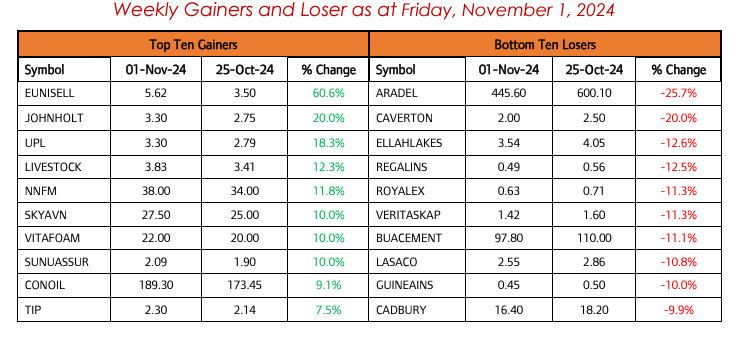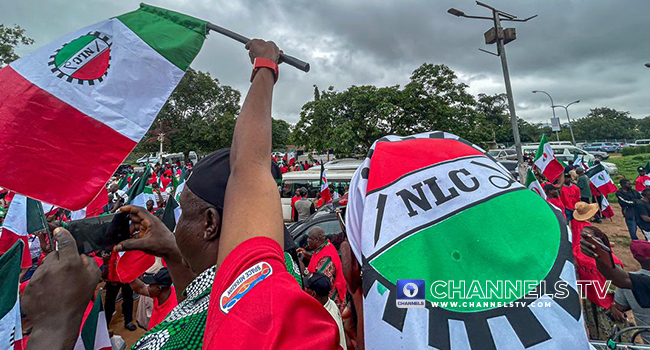The global economy is experiencing mixed trends, with the US real GDP growing driven by consumer spending and exports. In Nigeria, internally generated revenue increased by 26.03% in 2023, reaching N2.43 trillion. However, the country’s stock market experienced a bearish performance, with the All-Share Index declining 2.03% week-on-week. Investors remain cautious due to economic uncertainties and inflationary pressures. Explore the latest economic trends and updates from the US, Eurozone, and Nigeria, including GDP growth, inflation rates, and market performance.
The Bureau of Economic Analysis (BEA) reported that the United States real GDP grew by 2.80% YoY in Q3:2024, down from 3.00% in Q2:2024 and 4.90% in Q3:2023. This growth was driven by increased consumer spending, capital goods exports, and government defense spending. We anticipate continued growth in the US economy in FY 2024 due to disinflation and easing monetary policies.
Eurostat expects the Eurozone inflation rate to rise to 2.00% YoY in October from 1.80% in September, its first increase after two months of decline, largely due to a rise in service prices and food, alcohol, and tobacco costs. The ECB is likely to take a cautious approach as it monitors macroeconomic indicators and geopolitical tensions.
Meanwhile, the IMF approved a $605 million disbursement to Kenya as part of ongoing financial arrangements to strengthen its fiscal position and resilience to climate-related challenges. However, this funding is a temporary solution, and we expect renewed efforts to boost revenue while addressing public expectations post-protests.
Nigerian Economy
The Nigerian government has issued licenses to boost refining capabilities and infrastructure, including nine Licenses to Establish, seven Licenses to Construct, and four Licenses to Operate modular refineries. This initiative promotes private sector involvement and improves Nigeria’s self-sufficiency in refined petroleum products.
However, concerns remain about insecurity in oil-producing regions and potential threats to new refineries. The government also introduced a nine-month Voluntary Currency Disclosure, Depositing, Repatriation, and Investment Scheme, allowing Nigerians to disclose, repatriate, and formalize their foreign currency holdings. The scheme offers tax immunity, asset protection, confidentiality, tax-free interest, and flexibility for repatriation at prevailing rates.
The International Finance Corporation (IFC) pledged over $1 billion to support critical sectors in Nigeria, including agriculture, housing, infrastructure, energy, and the creative industry. The IFC’s partnership with the Central Bank of Nigeria is intended to expand domestic currency financing, providing Nigerian businesses access to naira-denominated loans at more sustainable and stable interest rates.
Revenue and Taxes
Nigeria’s internally generated revenue (IGR) for 2023 saw a 26.03% increase, reaching N2.43 trillion, compared to N1.93 trillion in 2022, according to the latest full-year figures reported by the Nigerian Bureau of Statistics (NBS). This growth is attributed to efforts to improve revenue collection mechanisms and address revenue leakages at both state and federal levels. Tax revenue rose by N501.31 billion year-on-year, indicating a renewed drive for fiscal sustainability. However, the revenue share in the national economy remains modest, accounting for only 1.08% of GDP.
Tax revenue constituted approximately 80% of the total IGR, about N1.9 trillion. The remaining N478 billion came from state-level ministries, departments, and agencies, highlighting the significant role of non-tax revenue streams. Lagos State led the pack, generating N816 billion, while the Federal Capital Territory followed with N211 billion. Rivers, Ogun, and Delta contributed 8.7%, 6.1%, and 4.7%, respectively, capturing over 60% of the total IGR. The Pay As You Earn (PAYE) system was the primary revenue contributor, accounting for 64% of total tax revenue and 51% of IGR generated.
Money Market
The fixed income market’s performance remained bearish, with average yields on treasury bills and bonds increasing by 50bps and 18bps to 23.63% and 19.49%, respectively, compared to 23.13% and 19.31% in the previous week. Liquidity in the system stood at N170.51 billion, with a decline in OBB and O/N to 19.25% and 19.68%, respectively.
The Nigerian Eurobond market’s average yield increased to 9.73% this week, driven by selloff activities and investors’ pursuit of higher premiums. Due to a cautious investor approach, expect muted activity next week.
Stock Market
Transnational Corporation Plc (TRANSCORP) delisted from the local bourse as part of its share capital restructuring initiative.
The All-Share Index (ASI) experienced a sharp 2.03% week-on-week cut, closing at 97,432.02 points, due to subdued investor sentiment and sell-offs across critical sectors, particularly in Industrial, Insurance, and Consumer Goods. This decline reflects cautious trading behavior amid ongoing portfolio rebalancing, with investors grappling with economic uncertainties and the latest macroeconomic data releases. The market capitalization dropped by 2.03%, wiping out N1.22 trillion in gains from prior weeks. The year-to-date return of the index now stands at 30.30%, with more stocks declining than advancing.

Sectoral performance reflected widespread losses, with the NGX-Industrial Goods sector declining by 3.70% week-on-week. At the same time, the Consumer Goods and Insurance sectors also recorded declines. The NGX Oil & Gas sector emerged as the primary gainer, up by 1.15% week-on-week, buoyed by robust sentiment surrounding CONOIL and ETERNA. The number of trades increased by 13.7% from the previous week, but the weekly trade value fell sharply by 36.4% to N54.63 billion.
The Nigerian equities market experienced a bearish performance this week, with the NGXASI dropping -2.03% and bringing the year-to-date performance to +30.30%. This was due to selloffs on ARADEL and some industrial goods tickers. Across sectors, NGXOILGAS and NGXBNK closed on a positive note. In contrast, NGXINDUSTR, NGXINS, MERI-TELCO, NGXCNSMRGDS, and MERI-AGRIC closed in negative territory. Top gainers were TRANSCORP, EUNISELL, JOHNHOLT, UPL, and LIVESTOCK, while ARADEL, CAVERTON, ELLAHLAKES, REGALINS, and ROYALEX topped the losers’ chart.
Conclusion
Since after the pandemic, Nigeria’s internally generated revenue (IGR) has shown a strong recovery, steadily increasing after a 34% drop to N1.08 trillion in 2020 from N1.64 trillion pre-pandemic. This recovery aligns with Nigeria’s efforts to diversify revenue sources amid fluctuating oil prices affecting federal allocations. However, challenges like tax evasion, regional economic disparities, and a large informal economy persist. Reforms are underway to broaden the tax base and integrate the informal sector. The proposed Tax Identification Consolidation and Collaboration (TICC) framework aims to improve tax compliance and boost revenue, highlighting the government’s commitment to reduce oil reliance and strengthen fiscal resilience.
The ASI’s decline reflects ongoing caution among investors, many of whom are taking a risk-averse approach amid fluctuating economic indicators and uncertain earnings. Liquidity concerns and inflation have dampened enthusiasm, with many waiting for clearer signals on monetary policy before investing. The market is expected to remain volatile in the near term due to this cautious sentiment. However, improvements in corporate earnings or stabilizing economic conditions could enhance investor confidence and support a recovery.
Comment, Like 👍, share this article, and Follow us on our social media handles.








